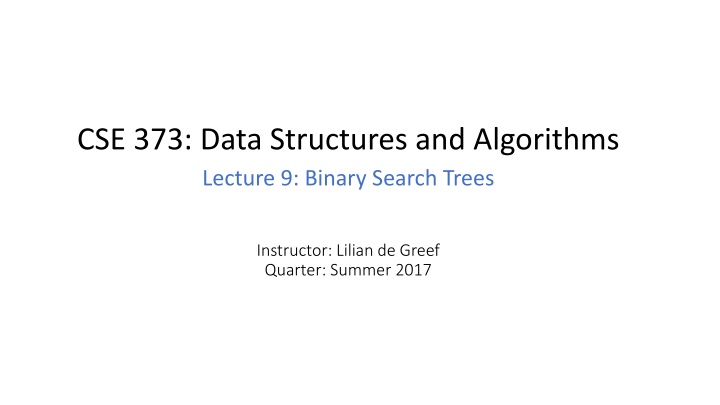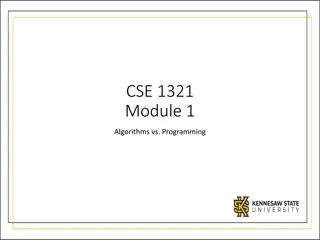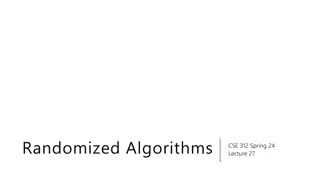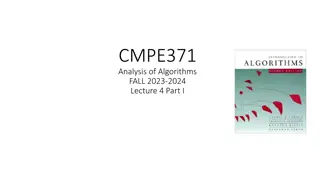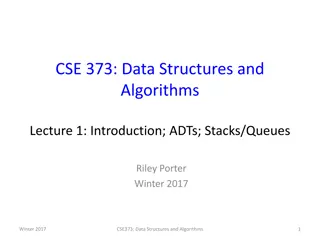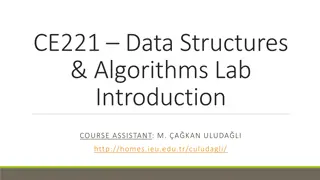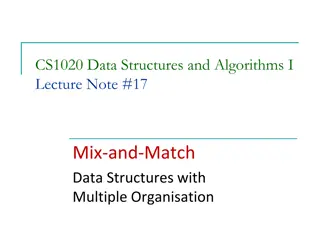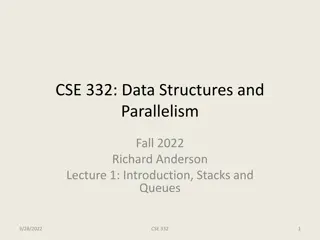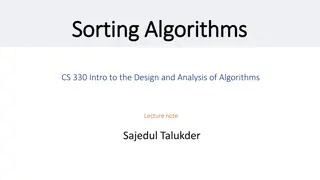CSE 373: Data Structures and Algorithms
Dive into the world of Binary Search Trees with instructor Lilian de Greef in this Summer 2017 lecture from CSE 373. Discover the fundamentals of organizing data efficiently, exploring tree traversal methods, and understanding the intricacies of binary search operations. Enhance your knowledge of data structures and algorithms through comprehensive discussions and practical examples presented in this informative session.
Download Presentation

Please find below an Image/Link to download the presentation.
The content on the website is provided AS IS for your information and personal use only. It may not be sold, licensed, or shared on other websites without obtaining consent from the author.If you encounter any issues during the download, it is possible that the publisher has removed the file from their server.
You are allowed to download the files provided on this website for personal or commercial use, subject to the condition that they are used lawfully. All files are the property of their respective owners.
The content on the website is provided AS IS for your information and personal use only. It may not be sold, licensed, or shared on other websites without obtaining consent from the author.
E N D
Presentation Transcript
CSE 373: Data Structures and Algorithms Lecture 9: Binary Search Trees Instructor: Lilian de Greef Quarter: Summer 2017
Today Announcements Binary Trees Height Traversals Binary Search Trees Definition find insert delete buildTree
Announcements Change to office hours for just this week Tuesday s office office hours / private office hours 12:00pm 12:30pm (not at 1:30pm!) Dorothy and I trading 2:00pm - 3:00pm office hours this week Same time and location Homework 1 Statistics Mean: 39.7/50 (+1 extra credit) Median: 42.5/50 (+0 extra credit) Max: 49/50 (+1) or 47/50 (+4) Standard Deviation: 10.18
Reminder: Tree terminology Node / Vertex Root A C B Left subtree Right subtree G D E F Leaves Edges H I J K L M N
Binary Trees Binary tree: Each node has at most 2 children (branching factor 2) Binary tree is A root (with data) A left subtree (may be empty) A right subtree (may be empty) Special Cases:
(Last weeks practice) What does the following method do? int height(Node root){ if (root == null), return -1; return 1 + max(height(root.left), height(root.right); } A. It calculates the number of nodes in the tree. B. It calculates the depth of the nodes. C. It calculates the height of the tree. D. It calculates the number of leaves in the tree.
Binary Trees: Some Numbers Recall: height of a tree = longest path from root to leaf (count edges) For binary tree of height h: max # of leaves: max # of nodes: min # of leaves: min # of nodes: For n nodes, the min height (best-case) is the max height (worst-case) is
Tree Traversals A traversal is an order for visiting all the nodes of a tree A Pre-order: root, left subtree, right subtree B C In-order: left subtree, root, right subtree F D E Post-order: left subtree, right subtree, root G
Tree Traversals: Practice Which one makes sense for evaluating this expression tree? Pre-order: root, left subtree, right subtree + In-order: left subtree, root, right subtree * 5 2 4 Post-order: left subtree, right subtree, root
Binary Search Search Tree (BST) Data Structure Structure property (binary tree) Each node has 2 children Result: keeps operations simple 8 5 11 Order property 2 6 10 12 4 7 9 14 Result: straight-forward to find any given value 13 A binary search tree is a type of binary tree (but not all binary trees are binary search trees!)
Practice: are these BSTs? 8 5 5 11 4 8 2 6 10 18 1 7 11 7 4 15 20 3 21
How do we find(value)in BSTs? 12 5 15 2 9 20 17 7 30 10
find in BST: Recursive Version Data find(Data value, Node root){ if(root == null) return null; if(key < root.value) return find(value, root.left); if(key > root.value) return find(value, root.right); return root.value; } 12 5 15 2 9 20 What is the running time? 17 7 30 10
find in BST: Iterative Version Data find(Object value, Node root){ while(root != null && root.value != value) { if (value < root.value) root = root.left; else (value > root.value) root = root.right; } if(root == null) return null; return root.value; } 12 5 15 2 9 20 17 7 30 10
Other BST Finding Operations findMin: Find minimum node 12 5 15 2 9 20 findMax: Find maximum node 17 7 30 10
insert in BST insert(13) insert(8) insert(31) 12 5 15 2 9 20 Worst-case running time: 17 7 30 10
Practice with insert, primer for delete Start with an empty tree. Insert the following values, in the given order: 14, 2, 5, 20, 42, 1, 4, 16 Then, changing as few nodes as possible, delete the following in order: 42, 14 What would the root of the resulting tree be? A. 2 B. 4 C. 5 D. 16
delete in BST Why might delete be harder than insert? Basic idea: Three potential cases to fix:
delete case: Leaf 12 delete(17) 5 15 2 9 20 17 7 30 10
delete case: One Child 12 delete(15) 5 15 2 9 20 7 30 10
delete case: Two Children 12 delete(5) What can we replace 5 with? 5 2 9 20 7 30 10
delete case: Two Children What can we replace the node with? Options:
delete case: Two Children (example #2) delete(23) 12 5 23 2 9 30 18 32 19 25 7 15 10
Practice with insert, primer for delete Changing as few nodes as possible, delete the following in order: 42, 14 14 2 20 1 5 42 16 4
delete through Lazy Deletion Lazy deletion can work well for a BST Simpler Can do real deletions later as a batch Some inserts can just undelete a tree node But Can waste space and slow down find operations Make some operations more complicated: e.g., findMin and findMax?
buildTree for BST Let s consider buildTree (insert values starting from an empty tree) Insert values 1, 2, 3, 4, 5, 6, 7, 8, 9 into an empty BST If inserted in given order, what is the tree? What big-O runtime for buildTree on this sorted input? Is inserting in the reverse order any better?
buildTree for BST Insert values 1, 2, 3, 4, 5, 6, 7, 8, 9 into an empty BST What we if could somehow re-arrange them median first, then left median, right median, etc. 5, 3, 7, 2, 1, 4, 8, 6, 9 What tree does that give us? What big-O runtime?
